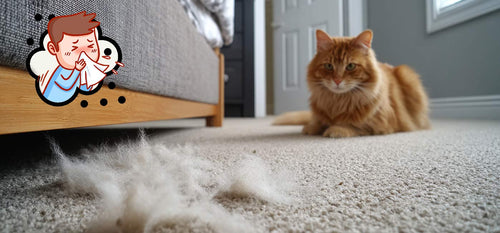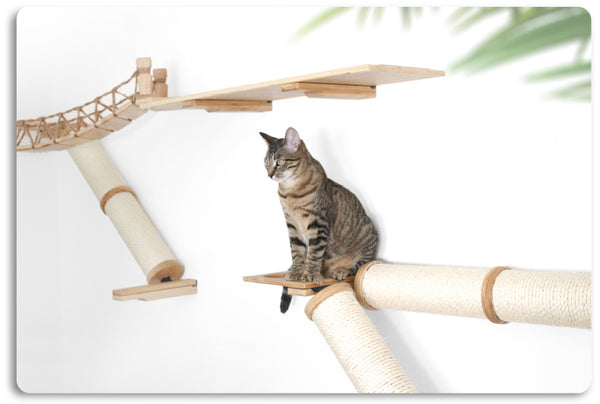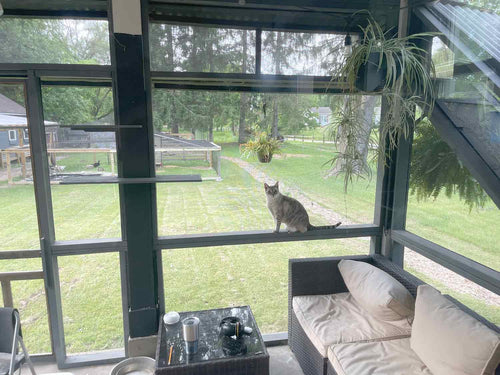Living with cat allergies doesn’t always mean you have to give up having a feline companion. With the right strategies, products, and routines, it’s possible to manage symptoms and still enjoy life with your cat. This guide covers practical tips from cleaning routines, to treatment options that actually make a difference.
First thing’s First: Can you be Allergic to Cats and Still Live with One?
Yes, many people with mild to moderate cat allergies successfully live with their cats. With a few changes to your home environment, regular cleaning, and proper medical support, it’s possible to reduce allergic reactions significantly.

Understanding Allergies to Cats: What causes allergies to cats?
Cat allergies are triggered by proteins found in cat’s saliva, skin (dander), and even urine, not just their fur. These proteins stick to surfaces like furniture, walls, and carpet, making them hard to avoid. Knowing what causes the reaction helps you target solutions that really work.
Common Signs of Cat Allergies:
-
Sneezing and runny or stuffy nose
-
Itchy, watery, or red eyes
-
Coughing or wheezing
-
Skin rashes or hives where a cat has scratched or licked
-
Asthma flare-ups
5 Easy Tips for Managing Cat Allergies at Home: How to Reduce Allergies to Cats
1. Air Purification
Invest in a high-quality HEPA air purifier for rooms where your cat spends most of its time. HEPA filters can trap airborne allergens, and reduce their spread throughout your home. Combine this with good ventilation by opening windows when possible or using exhaust fans to keep fresh air circulating.

2. Flooring & Furniture Choices
Carpets, heavy drapes, and plush furniture trap allergens. Opt for hardwood, tile, or laminate flooring, and use washable rugs. Choose furniture with smooth surfaces like leather or faux leather that’s easier to clean.
To help redirect your cat’s lounging and scratching habits, consider providing dedicated cat furniture like climbing shelves, or hammocks, that can be wiped down or washed easily. Even if you live in an apartment, adding a vertical space can be beneficial. See our article here about How to Catify your apartment. This not only makes cleaning simpler but also keeps your cat enriched and less likely to spend time on your couch. Feeling overwhelmed about where to start? See our blog here to help you get started.
3. Home Cleaning Routines to Reduce Cat Allergies
Keeping your home clean is one of the most effective ways to manage cat allergies:
-
Vacuum often with a vacuum that has a HEPA filter
-
Dust and mop floor weekly to reduce dander buildup
-
Wash bedding, throw blankets, Cat Trees and pillow covers frequently
-
Wash curtains or switch to blinds that can be wiped down
-
See our blog for more tips about How to Get Rid of Cat Hair
3. Cat Cleaning Routines
Reducing allergens at the source can be key. Try these tips:
-
Bathe your cat occasionally with vet-approved hypoallergenic shampoo for cats to help with human allergies
-
In between baths, wipe them down with allergen-reducing grooming spray
-
Brush your cat outdoors to minimize loose dander indoors
-
Wash your hands and change clothes after heavy play or snuggle sessions
-
Keep the litter box clean, and consider litter designed to reduce dust
4. Zoning: Allergy-Free Rooms
Designate certain areas, like your bedroom or home office, as cat-free zones to create safe spaces for your immune system to rest. Use baby gates or close doors, and consider an additional air purifier in these rooms for extra protection.
Treatments for Cat Allergies in Humans
How to get rid of allergies to cats:
-
Over-the-Counter Medications & Prescriptions for cat allergies
Antihistamines, nasal sprays, and decongestants can help reduce allergy symptoms. For more persistent reactions, your doctor might prescribe stronger medications or inhalers for asthma-like symptoms.
-
Immunotherapy & Allergy Shots
For long-term relief, allergy shots (immunotherapy) can help your immune system build tolerance to cat allergens. This treatment takes time, but can significantly reduce symptoms over the years.
-
Natural Remedies & Supplements
Some people find relief with natural options like saline nasal rinses, herbal antihistamines, or supplements like quercetin, and vitamin C. Always check with a healthcare provider before starting new remedies.
-
Special Cat Foods to Reduce Allergies
Certain cat foods are formulated to reduce allergens in a cat’s saliva and dander. While results vary, feeding these diets may help decrease allergen levels over time. Check out Purina's allergy reducing option here!
Final Tips & Encouragement
Living with cat allergies requires some lifestyle changes, but small changes can add up to big relief. Start by creating cat-free zones, adding air purifiers, and sticking to regular cleaning, and grooming schedules.
If symptoms don't improve, consult with an allergist for testing and treatment options. In severe cases, rehoming may need to be considered, but many allergy sufferers successfully live with their cats for years by managing allergens strategically.
Adding vertical cat wall furniture can also help by giving your cat their own climbing space, which can reduce contact with your couches, bedding and other areas where allergens collect.
FAQs
Can people develop cat allergies later in life?
Absolutely. Even if you’ve been around cats for years without a problem, allergies can develop at any age. This can happen due to changes in your immune system or prolonged exposure to allergens. If you suddenly notice symptoms like sneezing or itchy eyes around cats, it’s worth discussing with an allergist.
Can you outgrow allergies to cats?
It’s possible, but not very common. Some people notice their symptoms become less severe over time, especially with consistent exposure to cats, and proper allergy management. Others might undergo allergy treatments, like immunotherapy, which can significantly reduce or even eliminate allergic reactions. However, it’s also possible for cat allergies to stick around for life, so it’s best to work with an allergist to understand your specific situation.
Do cats know you’re allergic to them?
Not exactly. Cats can’t sense that you’re allergic, but they’re incredibly observant and may pick up on how you react to them. If you sneeze, avoid petting them, or keep your distance, some cats might interpret that as you needing space and back off a bit. Others, especially the more affectionate ones, might try harder to get your attention despite your sniffles!
Do air purifiers help with allergies to cats?
Yes, a good-quality air purifier with a HEPA filter can make a big difference. These filters capture airborne allergens like dander, and dust. While an air purifier wont completely eliminate allergens (Since they also settle on furniture, and clothing), it’s a helpful tool to reduce the overall amount floating in your home.
Can cats cause skin allergies?
They can cause skin allergies. Some people develop skin reactions when cat dander or saliva comes into direct contact with their skin. This can show up as redness, itching, or hives after petting or being scratched by a cat. Washing your hands after touching your cat, wearing long sleeves, and keeping up with regular grooming for your cat, can help minimize skin reactions.
Remember, everyone’s sensitivity is different, so it may take some experimenting to find what works best for you. If your symptoms aren't improving, don’t hesitate to talk to an allergist for personalized guidance. With patience and a few adjustments, you and your cat can share a happy, healthy home together.























